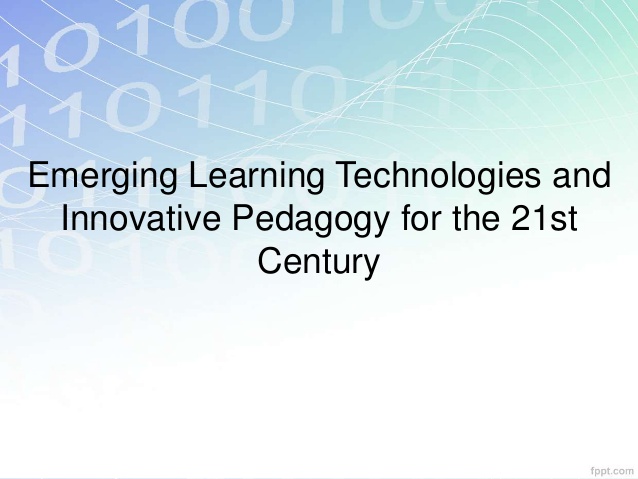
This past week, a lot of my time has been taken up with looking for jobs. I like to work an EAP pre-sessional during the summer when I have a long summer break for the chance to develop my skills and experience. More on that later. This week on the H17 course (Road to Open: Experiencing Open Education Practice), we were asked to connect e-learning theory from the past with more recent developments in thinking about learning. We'd looked at Nichols' (2013) ‘A theory for e-learning’ in which he names his 10 hypotheses (summarised below) and we were asked to consider the extent to which they are relevant to the predictions made by Ferguson et al. (2019), Innovating Pedagogy 2019.
Hypothesis 1: eLearning fits within face to face or distance education and behaviourism and constructivism.
Hypothesis 2: eLearning fits within the existing paradigms of face to face and distance education.
Hypothesis 3: The choice of eLearning tools should reflect rather than determine the pedagogy of a course.
Hypothesis 4: eLearning advances through the successful implementation of pedagogical innovation.
Hypothesis 5: eLearning can be used to present educational content and facilitate education processes.
Hypothesis 6: eLearning tools work best in a carefully selected, optimally integrated course design model.
Hypothesis 7: Use of eLearning tools and techniques should consider online vs offline trade-offs.
Hypothesis 8: Use of eLearning should consider how end-users will engage with the learning opportunities
Hypothesis 9: The overall aim of education does not change when eLearning is applied.
Hypothesis 10: Only pedagogical advantages are a sustainable rationale for eLearning approaches.
The predictions made by Ferguson et al. (2019), Innovating Pedagogy 2019 focus on innovative pedagogies that can be applied to e-learning. This is the first thing to note. Nichols' article is also about pedagogy and how an overall theory of e-learning can help drive pedagogy and e-learning pedagogy in particular. Nichols outlines 10 hypotheses to test that will help be a basis for a theory of e-learning. Ferguson et al. (2019), in 'Innovating Pedagogy 2019' outline 10 innovations in pedagogy that have the potential to make a significant difference in the near future of education. These are what are called Playful learning, Drone-based learning, Virtual studios, Place-based learning, Digitial Play, Decolonising learning, Learning with robots, Learning through wonder, Action learning, Roots of Empathy. Elearning is often defined as learning conducted via electronic media, typically via the Internet. These new emerging pedagogies may not all fit the typical idea of elearning. However, as Nichols states, elearning comfortably fits in the realm of face to face and online. All of these pedagogies could be utilized in both contexts. The focus of the two other articles we read is a little more on emerging technologies that could be utilised, adopting the above pedagogical approaches. The first, New Media Consortium’s Horizon Project: 2017 Higher Education Edition highlights Adaptive Learning Technologies, Mobile Learning, The Internet of Things, 'Next-Generation' LMSs, Artificial Intelligence and Natural User Interfaces. The authors suggest they may have a significant impact on learning in the
future. The second, Alexander et al. (2019), in their Educause Horizon Report: 2019 Higher Education Edition, shows the evolution to some extent of the tech featured earlier. Mobile Learning is still cited as an emerging technology. AI and adaptive learning technologies are featured in the form of virtual assistants. New emerging tech comes in the form of Analytics Technologies, Mixed Reality, and Blockchain, currently being developed for use in administrative and educational functions in universities in courses where the technology is relevant to the field. Reading about these new areas has inspired me to learn more, especially Next-Generation LMSs, Analytics Technologies, Mixed Reality. I noticed that after clearing our classrooms of the old Promethean boards at our school, recently, they were all quickly replaced with new, really expensive ones. Something none of the international staff were made aware of and it became even more obvious to me than previously how we are kept in the dark about even basic information about that is going on at the school except when we are needed. I find it difficult in that context to imagine being a member of a board involved in decision making. However, three pedagogies I think my organization would be most likely to invest in would be. Drone-based learning, Place-based learning, Learning through Wonder and Learning with Robots. In practice, placed-based learning or learning through wonder would be cheap and easy to implement, would fit well with the biology-chemistry curriculum, (we are a STEM focussed school) and the locations would be easy to access as we sit very close to a tree park, known for its biodiversity and which also features a mini lake. The school already builds, adapts and experiments with drones and they are used also to record school events. Again, components are getting cheaper and it fits the STEM focus of the school curriculum. Robotics is a major area of interest and activity both in schools and the country's main tech universities. If this can be extended to the use of robotics in learning other than in the sciences, this would be something I'd encourage strongly, as the school does need to break out of its narrow focus on STEM, to some extent.
References